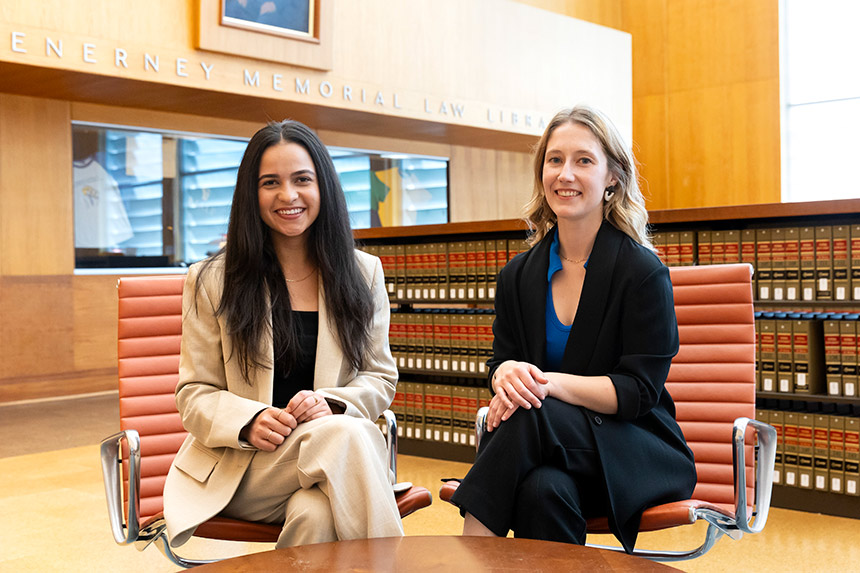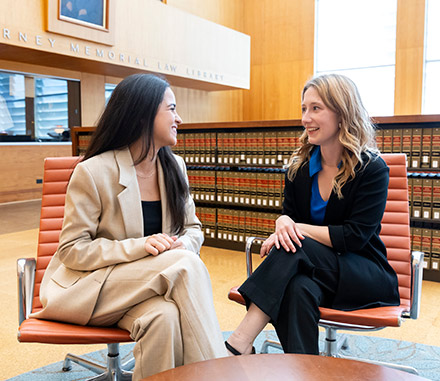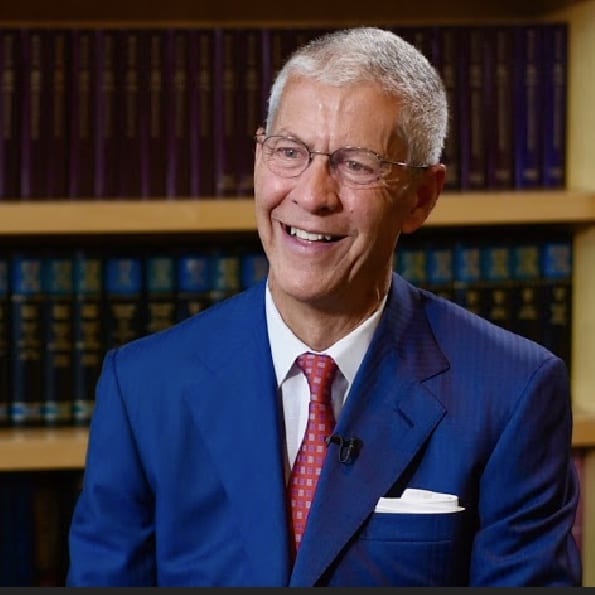
By Gwyneth K. Shaw
Berkeley Law students with an interest in litigation often gravitate toward large firms and corporate defense work. A growing student group — a leader in a national trend at law schools — is highlighting another option for freshly-minted lawyers: Work on the plaintiff’s side of the legal arena.
Founded by Nabila Abdallah ’22 and classmate Jessica Spierer during their student days, the Plaintiffs’ Law Association (PLA) now has around 200 members and a 14-student board. This summer, the group’s current leaders attended a conference of similar organizations, which banded together into a national coalition aiming to offer an alternative to the BigLaw pipeline.
 “I think a lot of us come to law school wanting to fight against the societal injustices we’ve witnessed and experienced. We want to, for example, hold financial institutions accountable, secure redress for victims of police brutality, and make oil companies pay for environmental disasters,” says PLA Co-President Leila Nasrolahi ’24. “But I think what a lot of students starting law school don’t know — or at least I didn’t — is that plaintiffs’ lawyers, in collaboration with governments and nonprofits, are doing that work.”
“I think a lot of us come to law school wanting to fight against the societal injustices we’ve witnessed and experienced. We want to, for example, hold financial institutions accountable, secure redress for victims of police brutality, and make oil companies pay for environmental disasters,” says PLA Co-President Leila Nasrolahi ’24. “But I think what a lot of students starting law school don’t know — or at least I didn’t — is that plaintiffs’ lawyers, in collaboration with governments and nonprofits, are doing that work.”
The PLA is trying to make that connection clearer. For example, Nasrolahi notes, a plaintiffs’ firm represented the employees in the Walmart v. Dukes gender-discrimination case. Plaintiffs’ attorneys just certified a class action in Black Lives Matter v. City of LA, a civil rights suit brought by protesters. And last year, plaintiffs’ attorneys won a unanimous pro-worker holding from the U. S. Supreme Court in Saxon v. Southwest.
“To me, PLA is an important group on campus because we’re illuminating careers on the other side of the ‘v’,” Nasrolahi says.
Kate Walford ’24, the other co-president, came to Berkeley Law after working with student employees and knew she was interested in workers’ rights. The PLA had just taken off, and she quickly discovered plaintiff-side work was a great opportunity to litigate cases on behalf of people.
The PLA is an important group at the law school, she says, to fill the perception gap.
“One of the myths we are trying to dispel is that the only viable job opportunity after law school is one doing corporate defense work,” Walford says. “I’ve talked to new law students who have no idea that most BigLaw firms only do defense work, and even more students who have no idea that entire firms dedicated to plaintiff-side practice exist. This whole other side of the ‘v’ really isn’t shown to law students.
“I think students at Berkeley should know about all of their options.”
Lecturer Shanin Specter, who teaches tort- and trial-related courses and is a legendary wrongful injury practitioner, is the group’s faculty adviser. He recommends plaintiff-side work to students for a number of career-boosting reasons: It can get you into deposition rooms and courtrooms early in a practice, which helps development, and it’s also a way to have your salary measured by your success for your client, not by your billable hours, he says.

Freedom from the billing system also makes the work more flexible for lawyers, Specter adds.
“Plaintiffs’ work is great. You get to pick your clients and their causes, as opposed to receiving a mandatory assignment from a big corporation or insurance company,” he says. “You help people who have been hurt achieve justice; that feels great in the best tradition of Berkeley and American legal activism. Often you can get the defendant to make systemic change, which benefits the community or the country.”
In addition to simply introducing students to the opportunities, the PLA is also trying to dispel the misconception that choosing plaintiff-side work means accepting a low salary. The reality is that many plaintiff-side firms pay very well, and the group organized and maintains a database of firm salaries to help students make an informed decision.
It also hosts events to introduce students to lawyers doing this kind of work, including a mixer in October and an introductory panel for 1Ls to learn about the sector. The PLA has an alumni and firm database, too, to further assist students looking for jobs and mentors. Founders Abdallah and Spierer, who both work at Bay Area plaintiff-side firms, remain deeply connected as well.
“These events are really central to our mission of cultivating future plaintiff-side attorneys –– students need to know about careers on the plaintiff side early on in their time at Berkeley Law in order to create a better pathway for those who might be interested,” Walford says.
She and Nasrolahi also consider improving the diversity of the plaintiffs’ bar a priority. They’re encouraged by the growing number of firms offering diversity fellowships, and see their work making the sector more visible and accessible to Berkeley Law students as a part of that.
For Nasrolahi, her experience with the organization has been serendipitous, and a model for what the group can accomplish: She came in as a casual observer and found what she considers her calling.
“Once I decided I wanted to be a civil litigator, plaintiffs’ practice seemed like the best way to work on the type of high-stakes cases that I felt passionately about,” she says.